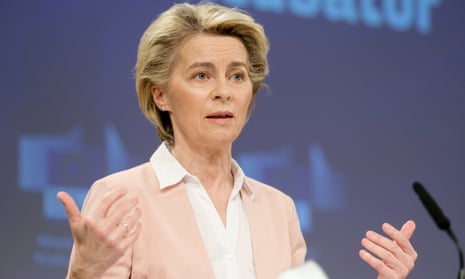The EU is “catching up” with the UK’s coronavirus vaccination programme, the European commission president has insisted as Hungary’s government started to administer a Chinese vaccine in the face of shortages.
A lack of doses among the EU member states continues to blight national plans, with Belgium the latest to warn of “serious delays” to its schedule, with vaccination of people over 65 postponed to the end of March.
There is also mounting evidence of the AstraZeneca vaccine being rejected and left unused in fridges following weeks of bad publicity, including Emmanuel Macron’s unsubstantiated claim that it is “quasi-ineffective” among older groups.
The latest figures suggest 27% of the UK population has received a first jab compared with 6% of the EU population.
Ursula von der Leyen told the Augsburger Allgemeine newspaper in Germany that while she understood the frustration there were signs of improvement.
“I understand very well the impatience that, now that the vaccine is available, citizens want to be vaccinated as quickly as possible and finally be protected,” she said. “We’re catching up. Britain has inoculated 17m first doses. There are 27m in the EU.
“In Italy, with a population similar to that of Great Britain, twice as many citizens received full vaccination protection with the second dose as in the UK.”
The commission president added she would have no concerns about being vaccinated with the Oxford/AstraZeneca jab.
“I would be vaccinated with the vaccine from AstraZeneca just as safely as with the products from BioNTech/Pfizer or Moderna,” she said. “When we started looking for the most promising out of the hundreds of candidates 10 months ago, we assumed an effectiveness of between 50 and 70%. Now everyone is on top of it. The vaccine has been carefully examined, found to be safe and effective, and approved.”
The EU’s deployment has struggled to gain traction in large part due to shortages in the first quarter of this year from suppliers including AstraZeneca, Moderna and Pfizer.
On Wednesday, Hungary became the first EU nation to start using China’s Sinopharm vaccine. Hungary’s prime minister, Viktor Orbán, said in a Facebook video that it had been necessary to avoid a third wave of infection.
The country of 10 million people has ordered 5m doses of the Chinese vaccine. Hungary was also the first to start administering Russia’s Sputnik V vaccine after its national regulator gave it emergency approval.
On Tuesday, AstraZeneca denied reports it would deliver fewer than half of the Covid-19 vaccines it was contracted to supply in the second quarter.
The company said it was striving to increase productivity to deliver the promised 180m doses from its global supply chains after Reuters reported that an EU official, directly involved in talks with the Anglo-Swedish drugmaker, had disclosed the company “would deliver less than 90m doses in the second quarter”.
AstraZeneca’s contract (pdf) with the EU, which was leaked last week, showed the company had committed to delivering 180m doses to the 27-nation bloc in the second quarter.
Asked about the EU official’s comment on vaccine doses, a spokesperson for AstraZeneca said the “most recent Q2 forecast for the delivery of its Covid vaccine aims to deliver in line with its contract with the European commission”.
He added: “At this stage AstraZeneca is working to increase productivity in its EU supply chain and to continue to make use of its global capability in order to achieve delivery of 180m doses to the EU in the second quarter.”
A spokesperson for the commission, which coordinates talks with vaccine manufacturers, said it could not comment on the discussions because they were confidential.
He said the EU should have more than enough shots to hit its vaccination targets if the expected and agreed deliveries from other suppliers were met, regardless of the situation with AstraZeneca.
The EU’s 27 heads of state and government will debate how to speed up the rollout at a virtual summit on Thursday. Von der Leyen said the issues of production and the need for a speedier means of authorisation, echoing the fast-track process used by the UK’s regulator, would be discussed.
The use of vaccination passports as part of a reopening of the tourism sector will also be debated by the leaders, with the Greek government particularly vociferous on the issue.
Von der Leyen said: “The vaccination certificate remains the first step and is important from a medical point of view because we have to monitor the effects and side-effects.
“On Thursday, we will discuss with the EU heads of state and government whether you can turn it into a vaccination certificate that gives you more freedom.
“Because that is a political question I think it’s important that everyone gets a fair chance to participate. Whether this is in the form of a vaccination offer or in some other way. But we’re not there yet.”
